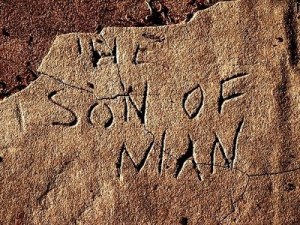In the last post I began with images of Jesus in the Gospel of Mark. In the first chapter of Mark we looked at Jesus' miracles of healing and exorcism. I discussed the fact that such acts were commonly attributed to great figures in the literature of the times both Jewish and Gentile. This was a common literary device used to establish the importance and legitimacy of the figure. As such, we can hardly consider this as a statement by the author of Mark on Jesus' Divinity.
In the second chapter of Mark, we looked at the story of Jesus telling a paralyzed man that his sins were forgiven. The teachers of the law protest that only God can forgive sins. Jesus does not respond that his authority to forgive sins comes from a claim of divinity. Instead, he states that the, "Son of Man", literally in Hebrew, "human being", also has this authority on earth, claiming this title for himself.
Although this title is most often used by God in the Hebrew Scriptures to address one of his Prophets to emphasise the difference between God's divine stature and the Prophet's mortal humanity, Jesus was most likely referring to the description of the final king in Daniel's vision who is described as being" like a son of man" and who is given authority and dominion over the earth. Some have interpreted this figure as being angelic in nature and as such that the Jesus of Mark is claiming here to be more than human. However, closer examination of Daniel's vision suggests otherwise.
As the four preceding kings seen as beasts in the vision are explained within the vision as representing mortal human kings, there is no reason to believe that the fifth king is not also a human being represented in a figurative way. It was also noted that if the writer of Mark wanted to infer that Jesus was more than human with the use of this title, the title would have been, "The One Like a Son of Man", rather than just, The Son of Man".
Let us to continue to explore the Gospel of Mark for images of Jesus that might suggest the author considered him to be, "more than man".
Mark Chapter 3:
11 Whenever the impure spirits saw him, they fell down before him and cried out, “You are the Son of God.” 12 But he gave them strict orders not to tell others about him.
We will put aside for the moment the whole question of whether Mark and his community affirmed the reality of sentient impure spirits or since they feature in much of the literature of the time, or if they are a metaphorical part of the story. Instead we will focus on the title the writer has them give Jesus. This is the same title that the writer gives Jesus in the opening verse of the first chapter:
The beginning of the good news about Jesus the Messiah, the Son of God. (Mark 1:1)Notice here that the title, "the Son of God", is a repetition or further clarification of the preceding title, "the Messiah". The title Messiah, means literally, "the anointed one". This title comes with a lot of baggage to the modern reader. What did it mean to this group? In Jewish Scripture the anointed one was a person who had been set apart or chosen by God for a special purpose such as to be king of the Jewish nation. Both Saul and David were anointed by the prophet Saul to announce that they had been chosen by God to be king. So the Markian community is not only calling him king, they are claiming that he is God's chosen king.
The title, "the Son of God" has a similar meaning. It is the title that God gives his chosen king of the people of Israel. For example, King David reports God as having said the following to him about David's son Solomon:
10: He shall build a house for my name. He shall be my Son, and I will be his Father, and I will establish his royal throne in Israel for ever.' (1 Chronicles, chapter 22:10)
The meaning of this title to the writer of Mark is quite different than that of a similar title used around the same time.
In 42 BC, Julius Caesar was formally deified as "the divine Julius" (divus Iulius) after his assassination. His adopted son, Octavian (better known as Augustus, a title given to him 15 years later, in 27 BC) thus became known as divi Iuli filius (son of the divine Julius) or simply divi filius (son of the god).[24] As a daring and unprecedented move, Augustus used this title to advance his political position in the Second Triumvirate, finally overcoming all rivals for power within the Roman state.[24][25] https://en.m.wikipedia.org/wiki/Son_of_God

No comments:
Post a Comment